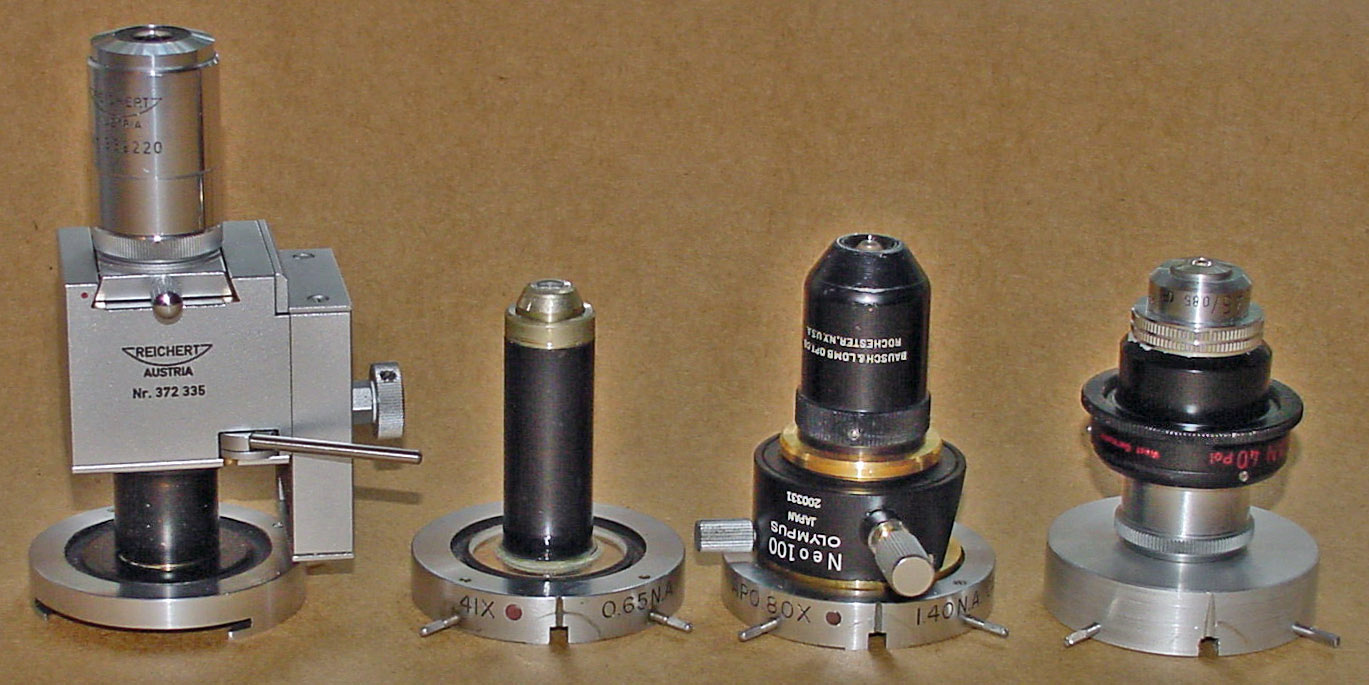adapted to a
Bausch & Lomb Research (I) metallograph
by George Langford
| When my consulting
company (Amenex
Associates, Inc.)
had commercial laboratory space, we used a really nice Reichert MeF2
metallograph that had a Nomarski differential interference contrast
accessory as well as a cute little microhardness testing device.
After the Enron debacle, it became uneconomical to keep the lab open,
and I had to give up the Reichert metallograph for lack of space.
However, I was able to assemble a working Bausch & Lomb Research
(I) metallograph from pieces obtained on eBay (but without the
extravagant optical bench) and I've wanted to work out a way of fitting
Nomarski DIC to that instrument. Here's
my previous progress, as
of January
21, 2007. The Bausch & Lomb Research (I) metallograph has polarized light as standard because it uses a Foster prism as the vertical illuminator. In order to defeat the polarized light, one has to place a quarter-wave plate in the optical path (the "B" setting of the illuminator). Therefore, there is no way to change the polarized light except to turn it on (crossed to extinction) or off (quarter wave plate). There is no in-between setting except that provided by the sensitive tint plate. That appears to present no handicap to the use of Nomarski differential interference contrast in my Bausch & Lomb Research (I) metallograph. Bausch & Lomb later made available a complex accessory for providing the intermediate settings. My previous setup had a serious error: I was putting the Nomarski wedge in upside down ! Once I realized that, progress came more quickly, and the images the setup produces became dramatically better and more useful. That required I make some adapters: |
 |
The brass adapter at left,
installed on a salvaged Research I centering mount, has a dovetail
fitting that goes into the open end of the Olympus Neo100 Nomarski
wedge at right. The threaded brass fitting needed to reduce the
large-size (26mm) Olympus thread to the standard RMS thread that my
selected objectives use can just be seen in the bottom center of the
Nomarski wedge. Even though the Nomarski wedge's markings are
upside down when it's all put together on the metallograph, that's the
right way to use it - this is an inverted microscope, after all. I generally use this adapter & DIC wedge with 215 mm T.L. objectives. |
 |
The Nomarski attachment shown at
left was evidently expressly made to fit the Research I
metallograph. It came with two BF/DF objectives, 16X and 40X, and
I recently added an 80X BF fluorite objective. All three have the
very long 250 mm T.L. that's needed to compensate for the height of the
mechanism that Reichert uses to move the wedge up & down as well as
in and out. The Research I's stage mechanism barely has the
vertical travel need to accommodate this monster. |
 |
The three adapters that I've
made are shown alongside a standard Research I 41X objective for scale. The third Nomarski device at far right is a Zeiss INKO meant for use with an EPIPLAN 40X objective. It was easiest to adapt because it has RMS threads on both ends. It's shown on the aluminum centering adapter I made to fit RMS-threaded objectives onto the Research I. |
 |
Here's how I match tube lengths.
The 41X objective stands about the same overall height as the 45X
Fluorite, 215 mm T.L. Leitz objective at left, which has an extension
tube added beneath it. I'm not certain about the tube length of the Research I's objectives, but I recently calculated that it's probably about 180 mm. |
Representative Images - Mild Steel (etched)
CMOS-Pro camera (color wheel) at 960x800 pixel count
If you right-click and select "view image" it'll come up on a new browser page at 1:1 pixel count (i.e., full size.)
Zeiss Inko DIC/Leitz 45X Fluorite/Green filter |
As at left, but with sensitive tint plate in optical path |
As above, but without any filter |
As above, but with no filter |
5X Bausch & Lomb BF 215 mm T.L. Objective
More Images - Effect of Objective Magnification using an Olympus MPlan 40 DIC Module
The eyepiece is a Zeiss Projektiv 3.2X with some pieces of dust at center in all these images.
As above, if you right-click and select "view image" it'll come up on a new browser page at 1:1 pixel count (i.e., full size.)
5X Bausch &
Lomb BF 215 mm T.L. Objective |
10X Bausch &
Lomb BF/DF 215 mm T.L. Objective |
13X Bausch &
Lomb BF/DF 215 mm T.L. Objective |
40X Bausch &
Lomb BF/DF 215 mm T.L. Objective |
Grey Cast Iron (unetched) - Effect of Various DIC Modules, Mostly Olympus
The eyepiece is again a Zeiss Projektiv 3.2X with some pieces of dust at center.
Bausch & Lomb 5X BF 215 mm T.L. objective (Neo 100) |
Bausch & Lomb
8X BF/DF 215 mm T.L. objective (MPlan 40) |
Bausch & Lomb
10X BF/DF 215 mm T.L. objective (MPlan 40) |
Bausch & Lomb
13X BF/DF 215 mm T.L. objective (Neo 100) |
Bausch & Lomb
20X BF/DF 215 mm T.L. objective (MPlan 40) |
Bausch & Lomb
40X BF/DF 215 mm T.L. objective (MPlan 40) |
Reichert 40X
BF/DF 250 mm T.L. objective (Reichert DIC module) |
B&L 4mm (54X)
215 mm T.L. apochromatic objective (MPlan 40) |